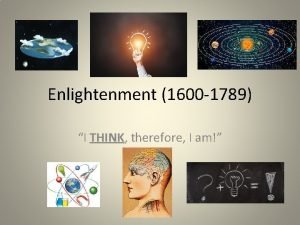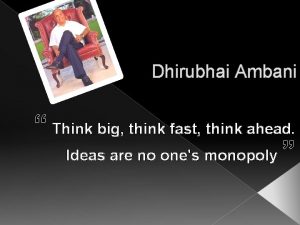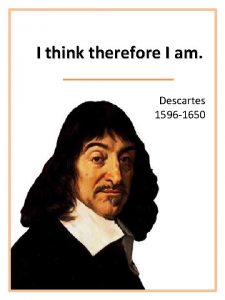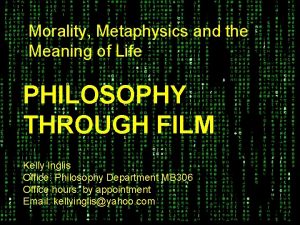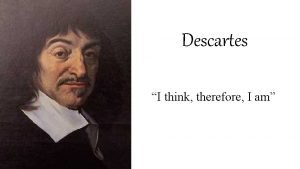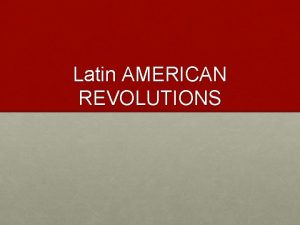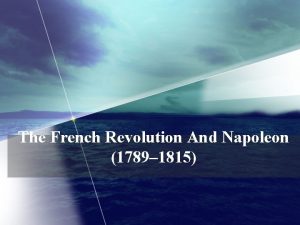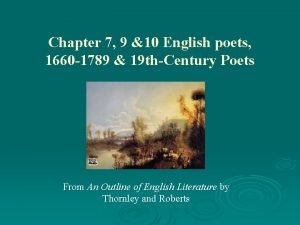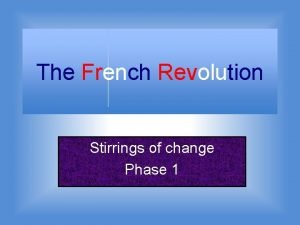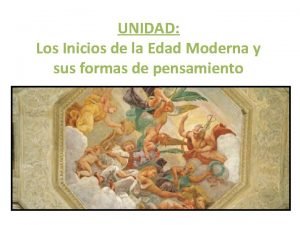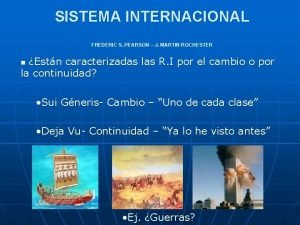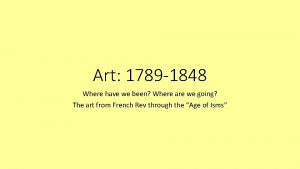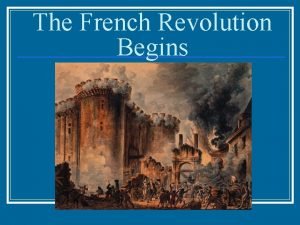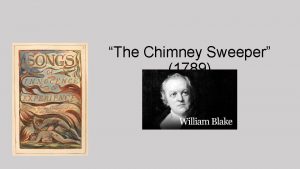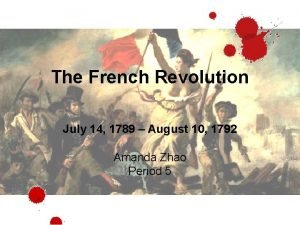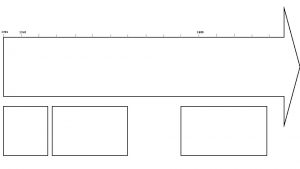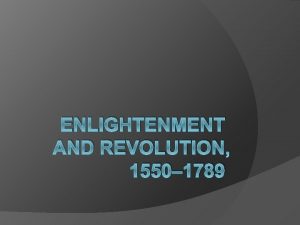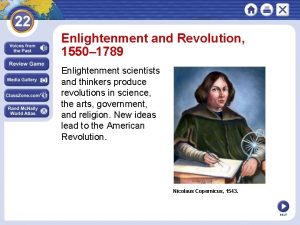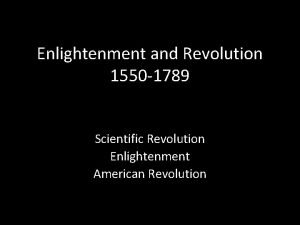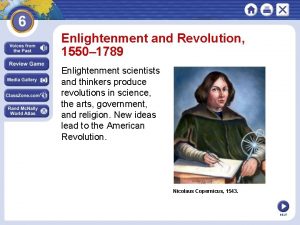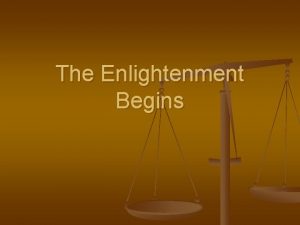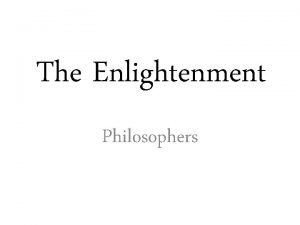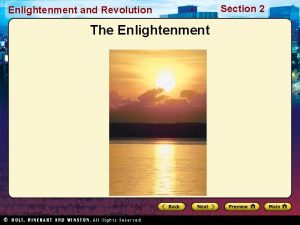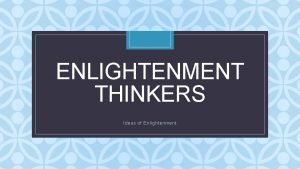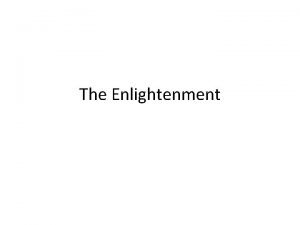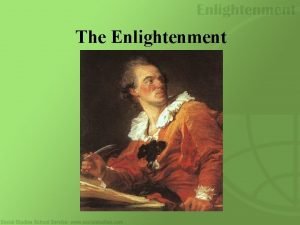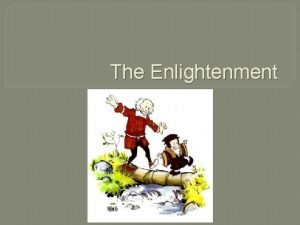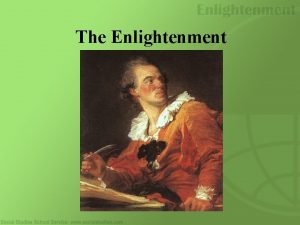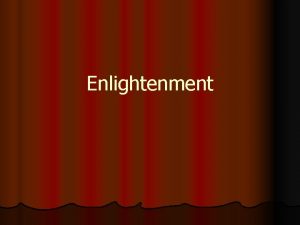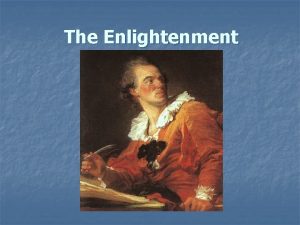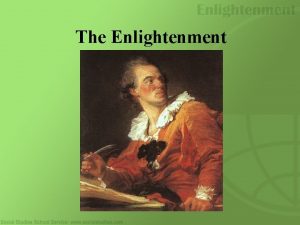Enlightenment 1600 1789 I THINK therefore I am




















- Slides: 20

Enlightenment (1600 -1789) “I THINK, therefore, I am!”

Enlightenment The period in European history that evolved from the Renaissance in which the questioning attitude formed the basis of the scientific method and philosophical movement that sought to explain the natural universe through reason, logic, and empirical data. • Logic vs. Dogma • Scientific Revolution • Age of Reason

Enlightenment Scientific Revolution = change in having verifiable facts replace traditional beliefs as the basis of knowledge. • Scientific Method – Experimentation of an 8 step method designed prove or disprove a hypothesis. • Science = Knowledge • Developed by Galilieo Galilei

Enlightenment Leading Enlightenment scientists who changed our understanding of the universe. • Nicolaus Copernicus (1473 -1543) – hypothesizes the heliocentric theory, which disproved the Ptolemy or Geocentric theory. • Galileo Galilei (1564 -1642) – Proves astronomer Nicolaus Copernicus Heliocentric theory that the earth revolves around the sun using a telescope. • Isaac Newton (1643 -1727) – Develops the laws of gravity and laws of motion

Nicolaus Copernicus • Polish Mathematician & Astronomer

Galilieo Galilei • Italian Astronomer & Scientist

Sir Isaac Newton • English mathematician & scientist

Enlightenment Philosophy = “Lovers of wisdom. ” Thinkers who would provide new ideas that would challenge our reliance on old ideas by writing books. • John Locke (1632 -1704) – English philosopher who wrote the Two Treatise on Government (1690), which stipulated on the social contract of the consent of the governed and natural rights. • Baron de Montesquieu (1689 -1755) – French philosopher who wrote The Spirit of the Laws (1748), which argued for limited government in separating the powers of government. • Jean Jacques Rousseau (1712 -1778) – French philosopher who expounded on the ideas of the Social Contract (1762). • Voltaire (1694 -1778) – French satirical writer who was an advocate for Freedom of Speech. His most influential book was Candide (1759). • Adam Smith (1723 -1790) – A Scottish philosophe whose book The Wealth of Nations (1776) developed the economic theory of capitalism. Note: This era was known as the “Age of Reason” as humans sought to use their minds of understanding and changing their world for the better.

John Locke

John Locke English born philosopher whose ideas and books contributed to the social contract and the establishment of good government. Two Treatise on Government (1690): • Natural Rights = Life, Liberty, & Property that all humans are entitled to by being human from God. • Tabula Rasa (“Blank slate”) – People are born without prejudice, but based on their environment and experience become corrupt overtime. • Consent of the Governed – Governments get their authority and power from the people. • Would greatly influence the Declaration of Independence (1776).

Baron de Montequieu

Baron de Montesquieu French philosophe whose ideas and books contributed to limitations on government power for the purpose of preventing the abuse of the people and their government. The Spirit of the Laws (1748): • Divide the powers of the government into three distinct branches (Legislative, Executive, and Judicial) • Would greatly influence United States Constitution (1789) and The Bill of Rights (1791)

Jean Jacques Rousseau

Jean Jacques Rousseau French philosophe whose writings on the social contract contributed to our understanding that governments should respond to the people. The Social Contract (1762): • General Will of the People – Majority points of view should be listened to and followed through by government. • People are corrupted by their environment and life experience. • Humans are inherently “good. ” • Helped write the French Declaration of the Rights of Man (1793).

Voltaire

Voltaire French philosophe whose writings on satire sought to expand Freedom of Speech & Press. Candide (1759): • Freedom of Speech are essential to being free. • Against state religions, government censorship. • Was imprisoned many times throughout his life for criticizing King and Religion. • Helped influence our Bill of Rights, specifically the First Amendment (1791).

Adam Smith

Adam Smith Scottish philosopher “Father of Capitalism” whose ideas on economics revolutionized trade and business. The Wealth of Nations (1776): • Laws of supply & demand = equilibrium (price) • Profit Motive = $$$$$$ • Laissez-faire = minimal government involvement. • Competition = lowers price; better quality • Free market = People are free to make and work as they wish. Note: Ended mercantilism, gave rise to capitalism, and influenced Alexander Hamilton and American capitalism.

Legacy of Enlightenment The Enlightenment in many ways is the movement of knowledge that helps shape our modern world by providing the ideas of change and the discovery of truth. • National Revolutions • Industrial Revolution • Explorations of space and science

Essential Questions 1. What does the word “science” mean and why is it an important subject for humans? 2. How many step are in the scientific method and explain the significance why it’s used? 3. Identify two leaders of the scientific revolution and explain their contributions? 4. What does the word “philosophy” mean? 5. Why is publishing a book more important than giving a good speech? 6. Identify two leaders of the Enlightenment and explain their contribution to science and the world?
 Voltaire i think therefore i am
Voltaire i think therefore i am Think big think fast think ahead
Think big think fast think ahead I think therefore i exist
I think therefore i exist Edo ergo sum meaning
Edo ergo sum meaning I think therefore i am explanation
I think therefore i am explanation Who said i think therefore i am
Who said i think therefore i am Robin and jay poem
Robin and jay poem Think fam think
Think fam think The divisions in spanish colonial society 1789
The divisions in spanish colonial society 1789 Napoleon 1789
Napoleon 1789 Against the gods 1789
Against the gods 1789 The tennis court oath
The tennis court oath Linea del tiempo de la prehistoria hasta la edad moderna
Linea del tiempo de la prehistoria hasta la edad moderna Symbol of the french revolution
Symbol of the french revolution 1797 - 1789
1797 - 1789 J martin rochester
J martin rochester Art 1789
Art 1789 The political and social system in france cartoon
The political and social system in france cartoon May 1789 french revolution
May 1789 french revolution Chimney sweeper songs of innocence
Chimney sweeper songs of innocence July 14 1789
July 14 1789
